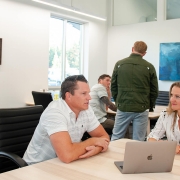Coworking members – who are they?
Flexible workspaces are for more than just freelancers & startups. Here are 12 types of workers using these spaces today.
*Originally published on Allwork.Space: https://allwork.space/2019/10/12-types-of-coworking-members-and-what-they-need-from-their-workspace/
Millions of workers across the globe are already participating in the distributed workforce, driving explosive growth in the coworking and flexible office industries. But who are they? Are they the same people that were using coworking spaces a decade ago? Who will they be a decade from now?
Flexible workspace is for more than freelancers and startup teams. The range of who is utilizing coworking & flexible offices has grown as the industry continues to mature.
Here are 12 common types or workers you can find in a flexible workspace:

1. The Remote-from-Headquarters Employee
This remote worker works for a company that has a headquarters somewhere out of commuting range. Since they live far from HQ, they may have to travel to meet with their teams in person, but otherwise are fully remote. What the full time remote worker needs is access to quiet or private space to take frequent video calls. They may not need a private office if they are traveling a lot. They will gravitate towards small meeting rooms that they can book several times a day, but will otherwise be found at their dedicated desk complete with family photos.
2. The Distributed Company Employee
Their entire company is distributed across multiple states or even countries. Similar to other remote workers, they still need private space for those video calls, but they may be more accustomed to cafe seating and phone booths. Since their company is setup to handle a distributed team, they leverage communication tools more efficiently than a company with only a few remote employees.
3. The Partially-Remote Worker
These workers may be within commuting distance to a company HQ, but have the ability to work away from that office a few days per week. They may also serve multiple markets, so need professional space in each.
They are more likely to want the consistency of a private office, despite only using it a few days per week. While they could setup a home office, they may have client meetings or prefer work-home separation.
4. The Digital Nomad
The wanderers, the jet setters, the van-lifers. Digital nomads may stay in one place for a few days or a few months, but ultimately will continue on their way with their laptops to a new destination.
They can work from anywhere & stay focused in a noisy cafe as easily as a quiet office. They have their system down – laptop, noise canceling headphones, a journal – all packed nicely in a single backpack. You’ll see them post pictures from the space on their Instagram accounts, so photo worthy spaces & branded coffee cups are a must.
5. The Solopreneur & Freelancer
The classic user of coworking spaces. They work for themselves as part of the Gig Economy, with clients that may be local or remote. Their schedules may be erratic, working through the middle of the night or taking off mid-week for a quick vacation.
If the majority of their clients are local, they need a professional space to take meetings that isn’t a coffee shop. Otherwise they need somewhere for client calls, but phone booths are probably fine. They also like having 24/7 access to meet their deadlines and work the hours they are most productive, whether that’s because they are a night owl or an early bird.
6. Startups
Another classic from the earliest days of coworking. The early stage startup that doesn’t know if it’s going to survive for 6 months or 6 years. When they sign up for flexible office space, open desks are a great fit for their budget. However, as the startup grows, they will need more space and will opt for team suites. If their growth is explosive and the workspace cannot accommodate what they need, they will graduate to their own company office elsewhere.
7. Small Teams
Many traditional small businesses are moving to flexible offices. These are the small accounting firms, legal teams, architectural & engineering firms. They may have 2 employees, or 10, but have typical office needs: coffee, a conference room, private office space, access to a printer, and a nice spot to eat lunch nearby.
8. Enterprise Clients
The increasing number of large corporations signing membership and service agreements is one of the biggest sources of growth for the flexible workspace industry. Larger private offices suites with custom branding is one way that these corporations are integrating with the flexible workspace industry. Having the ability to provide premier workspace from anywhere is a serious advantage in the ever increasing competition for top talent.
9. Traveling Corporate Employees
Those same big corporations frequently have teams & employees on the road. These workers need a nice office space for a day or two at a time while they make the regional rounds. Perhaps they are on a family vacation when something critical happens and need to get some work done while the family is off playing. If these workers are traveling through the same community enough, a private office is ideal, although open desk space with abundant private meeting rooms and phone booths can usually meet their needs as well.
10. The College Student
Sometimes the local coffee shop just doesn’t cut it when you need to study for that calculus test. What is needed is a giant whiteboard, a change of scenery, and lots of coffee. They could also be an aspiring entrepreneur wanting to get a taste for startup life, so sign on for an internship with the workspace itself or a member company. Students bring incredible energy to a flexible workspace, but typically need discounted or sponsored membership rates.
11. Non-Profit Organizations
Non-profit organizations have tight budgets, and a need to build a base of support to help them focus on their mission. Flexible workspace, that can be expanded or contracted depending on this year’s grant cycle is a huge benefit that lets the organization focus on making the most impact with what they have. These groups are heavy users of larger meeting space, which they need for board meetings, volunteer training, or events.
12. Event Hosts
Coworking spaces are often more affordable & more trendy than the traditional conference center. Event hosts that are looking for a smaller venue, or one that is more aligned with their audience are drawn to the unique characteristics of flexible workspaces in addition to their accessible pricing & friendly staff.
Understanding who is utilizing flex space is critical to drive the growth & sustainability of the flexible workspace industry. These are customers that not only exist today, but will exist in the near future as more and more companies realize the benefits of remote teams & flexible work. Meeting the needs of these customers by understanding who they are is key to the success of every coworking space, serviced office, & flexspace provider.
Further Reading:
- DeskMag 2019 State of Coworking: http://www.deskmag.com/en/2019-state-of-coworking-spaces-2-million-members-growth-crisis-market-report-survey-study
- https://www.forbes.com/sites/samantharadocchia/2018/07/31/50-of-the-us-workforce-will-soon-be-remote-heres-how-founders-can-manage-flexible-working-styles/#2762e9db5767
- https://www.upwork.com/press/2017/10/17/freelancing-in-america-2017/
- https://allwork.space/2018/08/the-top-5-most-valuable-companies-that-are-using-coworking/


